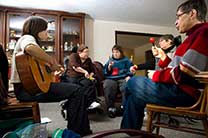It’s extremely rare that a child already knows who his or her housemates will be and that all the parents can work together effortlessly. Few have even two or three friends who want the same things, let alone families who also want the same things.
Timing is also tricky. One child may be ready for emancipation, but his or her friends might not be. Parents who have developed a home warn that finding compatible housemates can take a long time. They had to meet with many families before finding a match.
Places to Find Potential Housemates
- Ask for a list of other interested families from your county board.
- Make contacts through a provider agency or community groups.
- Go to meetings and seminars for relevant groups/topics.
- Join community activities and support groups.
- Start your own group for families interested in family directed housing. This can serve to find housemates, share information, and provide support.
- Tell your plans to anyone willing to listen—word-of-mouth is a powerful tool to make connections in a natural, informal manner.
Potential Housemate Checklist
Whenever possible, individuals should be allowed to live with established friends. You need to use your best judgment to help your child choose compatible housemates, whether they are established friends or new acquaintances.
Consider the following when choosing housemates. Make sure you understand your child’s preferences first, then match them up with potential housemates.
- Preferred Location
- Does he or she want to live close to the family?
- Does he or she prefer a certain neighborhood?
- Should the home be in a city or a rural setting? [INSERT IMAGE: Bunts2.jpg (“city setting” look)]
- Or near a bus route or work?
- Pace of Life
- What is the person’s preferred level of activity (both at home and in the community)?
- Do medical problems or behavioral needs affect activity level?
- Note: Housemates should be able to maintain their chosen lifestyle, rather than having to do what everyone else likes to do. Vast differences in lifestyle can lead to conflicts.
- Environmental Preferences
- Does the person have sensitivities to or preferences for sounds, smells, lighting, or temperature?
- Are there allergies or other environmental sensitivities?
- Are there any medical conditions affecting environment (light, temperature, sound)?
- Daily Schedules
- Does he or she work during the day or night/evening?
- What is the preferred sleep schedule?
- When does he or she prefer to be active?
- Note: Differences in schedules can sometimes be advantageous. If one person works days and another works evenings, both would be able to have more quiet time at home. On the other hand, if the person who works evenings likes to stay up late, keeping the early-risers awake, conflict could arise.
- Common Interests
- What are the person’s hobbies?
- Preferred entertainment (TV shows, music, etc.)? Preferred food?
- What interests are similar to other potential housemates?
- What interests are different?
- Note: Sharing interests is not a prerequisite to getting along with a housemate. Common interests, however, can increase community and minimize potential conflicts. They also increase the potential for combining resources. For example, families with musically-inclined children contract with a music therapist.
- Common Needs or Disabilities
- What support needs does this person have?
- What diagnoses or disabilities does he or she have?
- Which of these needs affect lifestyle the most? In what ways?
- Note: It is not appropriate to expect a person to want to live with someone else just because of a shared diagnosis or similar support needs. However, it is often practical to have several people with a particular support need living together. For instance, individuals who have Prader-Willi, a genetic condition that causes a severe eating disorder, are likely to find it easier to maintain their strict dietary regimen by living with someone a similar diet.
- Common Needs or Disabilities
- What support needs does this person have?
- What diagnoses or disabilities does he or she have?
- Which of these needs affect lifestyle the most? In what ways?
- Note: It is not appropriate to expect a person to want to live with someone else just because of a shared diagnosis or similar support needs. However, it is often practical to have several people with a particular support need living together. For instance, individuals who have Prader-Willi, a genetic condition that causes a severe eating disorder, are likely to find it easier to maintain their strict dietary regimen by living with someone a similar diet.
- Personal Priorities
- Are certain beliefs or faith practices important to him or her?
- Is there a significant other or another important relationship to consider?
- Does the person feel most comfortable with housemates or support staff of a certain gender?
- Note: Although diversity generally enriches relationships, in some situations, people’s beliefs or faith practices make them incompatible. Another common issue relates to gender. For example, a female housemate may not be comfortable with a male support staff, while a male housemate might really benefit from male staff.
Legal and Other Issues Affecting Housemate Choice
In addition to concerns about the compatibility of potential housemates, other practical issues directly affect the selection of housemates.
- Number of Residents:
- Funding — In Ohio, supported living and Medicaid Waiver funds can be used only in a home with 4 or fewer people with a disability. Talk with the residential services department of your county board to confirm what rules apply.
- Zoning Laws — Most zoning rules include restrictions on more than 3 or 4 unrelated people living in a single-family home. More than this may require an approved variance.
- Building Code — In Ohio, if 6 or more unrelated people with a disability live in a home, it must meet stringent institutional building code requirements. These add substantial cost to the development of the home, as well as complicating the zoning issues.
- Support Requirements:
- Home Design/Accessibility — A home needs to be physically accessible for all housemates. Other needs could also have an impact on the layout of the house or other amenities. For example, the arrangement of the bedrooms might be important because a need for assistance during the night. [INSERT IMAGES: next to or near each other Jennings2.jpg and Hilliard1.jpg (stairs vs no stairs)]
- Amount of Support Staff — Sometimes issues about the type of assistance needed or the times when it is needed increase the cost of services beyond available funding. For example, if every person in the house needs 24-hour support but has different schedules, more staff will be needed, increasing the cost.
- Funding for Each Housemate:
- Different Sources — If housemates receive funds from different sources, families should talk with Service and Support Administrators and explore how billing for services and other regulations may be affected.
- Availability of Funds — There is no guarantee that everyone will be able to secure funding at the same time. Understand how much funding is available and when before purchasing a home.













